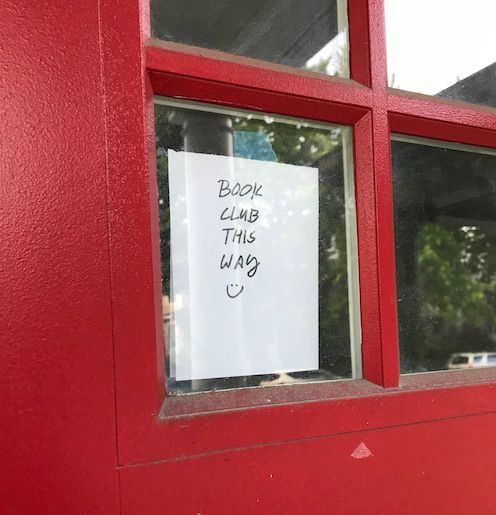“In Your 30s, Book Clubs Are The New Bars”

More and more thirty-somethings are trading post-college nights at the bar for living room book discussions with homemade popcorn and various liquid-holding-containers full of wine.
Yes, millennials are adults now, but that doesn’t mean we have a set of 8+ matching glasses.
There are no great statistics on this, because there are not a lot of great stats about readers + book clubs out there…. Something we will eventually change!
But — our Italic Type consumer research and customer discovery turns up this insight again and again.
Why is this happening? To what extent are book clubs becoming a foundational part of folks’ social lives? What is it people are craving and finding in discussing books?
A few thoughts:
Social incentive to read
Book clubs give people a social incentive to read more!
Why, you might ask, would people who love to read need more incentive to actually do so?
It’s similar to working out at the gym, eating healthy, or any other thing that is hard to do in the moment but you know is good for you and you will be happy you did it. The buddy system makes the activity more fun - and makes you more accountable.
In a recent survey of avid readers, 75% said they felt bad about not reading as much as they would like to. What’s with the guilt? It can be HARD sometimes to carve out the time for reading.
Book club, like weekly yoga class, helps prioritize and focus our scattered, battered modern minds on what we actually want to be doing.
People love to learn and grow
Books, and people, thrive on conversation.
Don’t take it from me, take it from real life, thirty-something, book club dude: Mike Cittadino.
“The thing I love about book club is getting different perspectives on the book. Like if you thought of it one way, and someone else sees it a different way, learning from really smart people.”
When you read a book, knowing you’ll be discussing it, you’re primed to get even more out of that book. And not just that, but RETAIN more of what you learned.
Perhaps you’re paying more attention to themes and characters. Or underlining significant passages. Or thinking about questions your curious about or parts you just didn’t understand.
And then in discussion you are actively recalling your thoughts, reactions, and feelings about the material. Listening to others opinions, thinking through whether you agree or disagree and why.
This pattern of participation does something really important in the brain. Substantive exchanges of ideas and opinions fuels retention by reinforcing neural pathways of information.
End result? Regardless of whether you liked or disliked the book, you are for sure going to remember more about it if you’re having a discussion about it.
Real fun, real relationships
The older you get, the tougher it can be to make new friends and maintain old friendships. People get married and have kids, move away, and generally settle in to their adult ruts.
The spontaneous bar nights and intramural leagues get fewer and farther between. And despite the fact that there are more ways than ever to connect with anyone with any interest all over the world, people still crave developing real, meaningful relationships.
More people in their 30s are discovering that book discussion groups are a great way to form relationships and connect deeply with others.
“It gives you a chance to interact with people and get to know people differently,” Mike C reflected recently. He’s been a part of a book group for over 4 years, only ever missing one meeting.
Joelle Cosmas, another thirty-something drawn to the power of book clubs nailed the insight: “in your 30s, it’s like book clubs are the new bars”
But….
When the wine glass runneth over
So, we know there’s something going on with book clubs.
The random old bar nights of youth are gradually slipping away and in their place more adults are turning to book clubs to spark intellectual curiosity, prioritize more reading, and develop friendships.
But we’ve also heard another strain of complaint in our customer discovery.
About what happens when people try out a book club and find it’s really more of a wine drinking/ kid catch up / uninvited relationship advice / socializing affair.
Book clubs come in all flavors, shapes and sizes. Some are led by paid, professional facilitators. Yes, this is a job, and I’ve talked to a few of them, and it is just as cool as it sounds.
Some are really just the classic “get together to drink wine and not really talk about the book.” And if that’s your deal, great. And if people read half-a-book more than they would have otherwise read, I still think it’s good.
But if you want something more and haven’t found it, don’t despair! Don’t give up.
First - Try organizing your colleagues and friends who you know are interested in reading. Let ‘em know you want to start a book club. The kind where you actually discuss the book.
Then - Jump in to develop a few discussion questions in advance. It keeps the conversation running smoothly. Check out our post on how anyone can come up with great discussion Qs.
And...wait for it... Hold on tight for the beta release of Italic Type! Virtual, synchronous or asynchronous book discussion with anyone, anywhere any book. With Italic Type you'll be able to scratch your itch for book discussion with the people you choose, without needing to be a part of a formal, traditional in-person book club.
